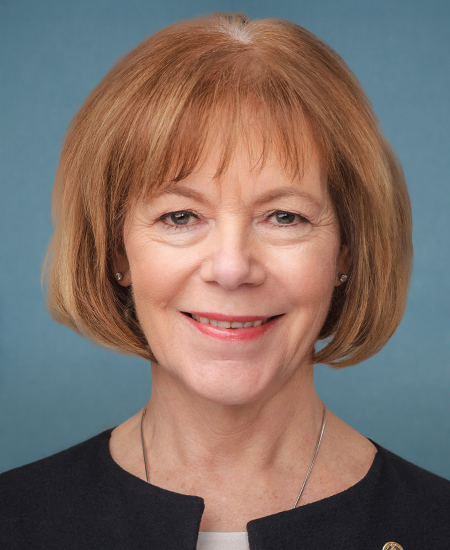Sen. Tina Smith

Stats
Sponsored Legislation

US Congress 118th Congress
Access to Family Building Act [S.3612]
A bill to prohibit the limitation of access to assisted reproductive technology, and all medical care surrounding such technology.

US Congress 118th Congress
Homebuyers Privacy Protection Act [S.3502]
A bill to amend the Fair Credit Reporting Act to prevent consumer reporting agencies from furnishing consumer reports under certain circumstances, and for other purposes.

US Congress 118th Congress
Outdoors for All Act [S.448]
A bill to codify the existing Outdoor Recreation Legacy Partnership Program of the National Park Service, and for other purposes.

US Congress 118th Congress
A resolution recognizing the seriousness of widespread health care worker burnout in the United States and the need to strengthen health workforce well-being, and expressing support for the designation of March 18, 2024, as the inaugural "Health Workforce Well-Being Day of Awareness". [SR-567]
A resolution recognizing the seriousness of widespread health care worker burnout in the United States and the need to strengthen health workforce well-being, and expressing support for the designation of March 18, 2024, as the inaugural "Health Workforce Well-Being Day of Awareness".

US Congress 118th Congress
ReConnecting Rural America Act of 2023 [S.1642]
A bill to amend the Rural Electrification Act of 1936 to establish the ReConnect program under that Act, and for other purposes.

US Congress 118th Congress
John R. Lewis Voting Rights Advancement Act of 2024 Election Worker and Polling Place Protection Act [S.4]
A bill to amend the Voting Rights Act of 1965 to revise the criteria for determining which States and political subdivisions are subject to section 4 of the Act, and for other purposes.
Sponsored by: Sen. Robert Casey Read Twice And Referred To The Committee On The Judiciary. on 02/29/2024

US Congress 118th Congress
Improving Social Determinants of Health Act of 2024 [S.3847]
A bill to authorize the Director of the Centers for Disease Control and Prevention to carry out a Social Determinants of Health Program, and for other purposes.

US Congress 118th Congress
Survivor Financial Safety and Inclusion Working Group Act [S.3835]
A bill to establish an interagency Working Group to study financial safety and inclusion for survivors, and for other purposes.

US Congress 118th Congress
A resolution recognizing and honoring Burnsville, Minnesota, law enforcement and first responders for their heroic actions. [SR-577]
A resolution recognizing and honoring Burnsville, Minnesota, law enforcement and first responders for their heroic actions.

US Congress 118th Congress
A resolution recognizing the 100th anniversary of the National League of Cities and the support it provides to municipalities across the United States. [SR-583]
A resolution recognizing the 100th anniversary of the National League of Cities and the support it provides to municipalities across the United States.